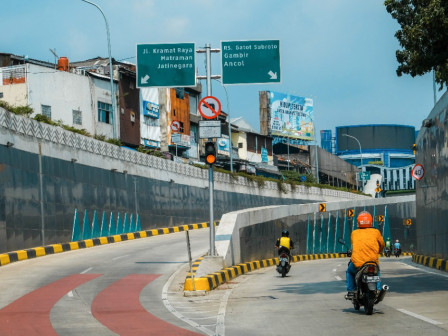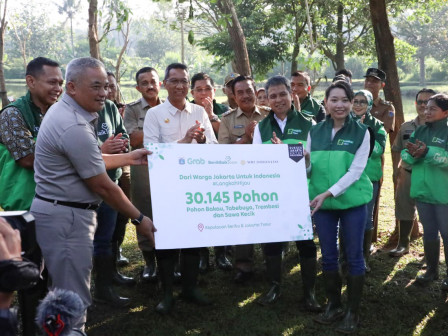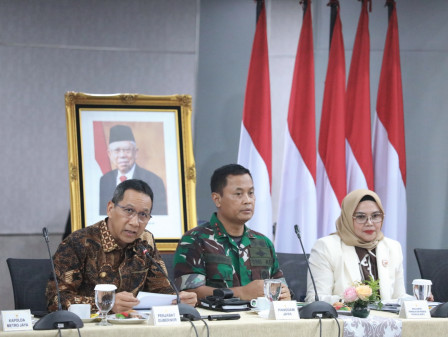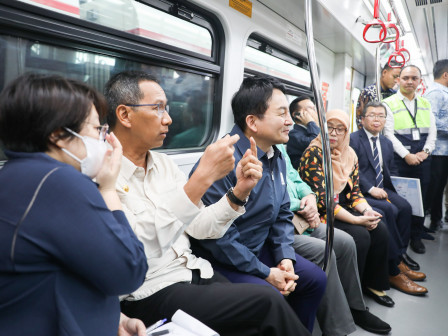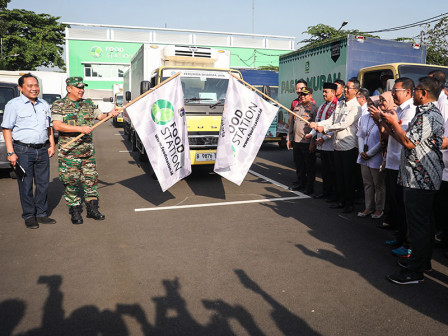Here are Heru's Steps to Unravel Congestion in Jakarta
Reported by Aldi Geri Lumban Tobing | Translated by Nugroho Adibrata
The Jakarta Provincial Government keeps working to overcome the problem of traffic jams in the capital city. Various conveniences in mobility have actually been presented as a solution to unravel traffic jams. Even, Jakarta Acting Governor, Heru Budi Hartono made the congestion control program a priority agenda to find a solution.
To facilitate access for residents' mobility in their daily activities
Various steps have been taken to control congestion, including the integration of public transportation modes such as Transjakarta bus, MRT, and LRT which make it easier for residents to change modes. For instance, the construction of MRT Phase 2A (Bundaran HI - Kota) and LRT Jakarta Phase 1B (Velodrome - Manggarai).
"One of the programs aimed at improving mass transportation facilities in Jakarta is to facilitate access for residents' mobility in their daily activities, while at the same time supporting the growth of the economy," he expressed, as quoted by Jakarta PPID's press release, Tuesday (3/21).
Dinkes Launches Jakarta Move to Overcome Stunting and TuberculosisThe construction of MRT Jakarta Phase 2A (Bundaran HI - Kota) as of 25 February 2023 has achieved 20.33 percent progress. While, the LRT Jakarta Phase 1B is planned to have 6.4 kilometers long and the auction construction will be carried out in June 2023.
In the process of building this mass transportation facility, the Jakarta Government is synergizing with various parties, including central government, such as Transportation Ministry, Public Works and Public Housing Ministry (PUPR), and BUMN Ministry. Including in the Phase 2 Station Area Arrangement program, such as at Tebet, Palmerah, and Gondangdia train stations.
Then Manggarai Station is in the planning for further arrangement. In addition, to reduce the buildup of commuter line passengers at Tanah Abang station, additional train lines were also carried out.
"Coordination and synergy with the Central Government continue to be carried out on an ongoing basis, thus the development process can be executed optimally and it can make people more happy and comfortable in the future using public transportation modes in Jakarta," he explained.
Aside that, during the series of the G20 Presidency in Bali last November 2022, the Jakarta Government has also agreed on a cooperation agreement for the development of MRT Jakarta project with Japan, UK, and South Korea to reach more areas and facilitate people's mobility.
Not only that, cooperation was also made with the West Java Provincial Government and Bekasi City Government to develop the East-West MRT (Cikarang - Jakarta - Balaraja) Phase 1 - Stage 1 (Tomang-Medan Satria). Its development is expected to increase public interest in switching to public transportation, and is affordable not only in Jakarta, but also in the buffer zones (Bogor, Depok, Tangerang, and Bekasi).
Further, the Transjakarta shelters revitalization is also being carried out optimally. Several bus stops have now started operating post-revitalization, such as Bundaran HI Bus Stop, GBK Bus Stop, City Hall Bus Stop, and Kwitang Bus Stop. The revitalization of the Transjakarta bus stop which has been integrated with the Commuter Line station and the LRT station is Cawang Cikoko Station.
To improve traffic flow, the Jakarta Government keeps synergizing various parties. Through Jakarta Transportation Agency (Dishub), it is currently conducting trials of closing traffic loops (U-Turns) to reduce queues and traffic delays caused by maneuvering vehicles, as well as trials of implementing the One Way System (SSA) in several locations to reduce accident rates by reducing the point of conflict of vehicles from opposite directions and to increase road capacity. Additionally, access to sidewalks and skywalks continues to be expanded. As for sidewalks, 110,449 m2 has been built and for complete streets, 70,517 m2 has been built.
These various efforts are a concrete manifestation of the Acting Governor's Priority Program, particularly in controlling traffic jams in Jakarta. Because success in developing mass public transportation and optimizing road user infrastructure is expected to drive the progress of Jakarta and Indonesia's economic growth rate.

